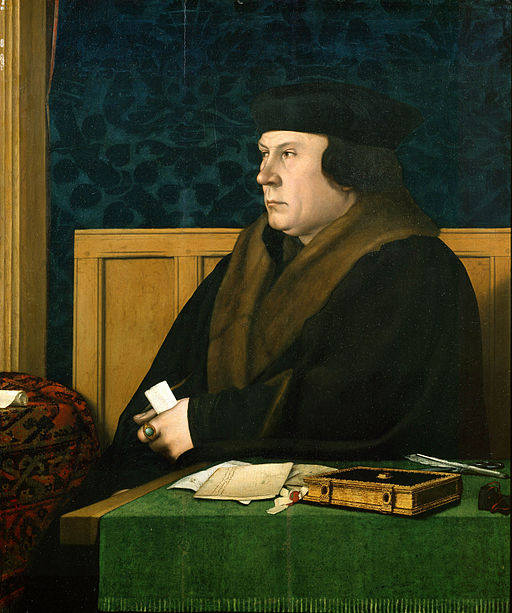
The Wolf of Wolf Hall: Thomas Cromwell’s Rise and Fall
The success of the recent television adaptation of Hilary Mantel’s novel Wolf Hall may have left some of you wanting to know a bit more about its pivotal figure, Thomas Cromwell. The novel and series portray him as a Machiavellian master manipulator. Was this the case? Read on and decide for yourself.
Thomas Cromwell, 1st Earl of Essex (1485 – 1540), rose from the slums of Putney to become Henry VIII’s Chief Minister, and masterminded the King’s divorce from Catherine of Aragon. He provided much needed finance for the royal court by closing over 800 monastic houses and selling off church land. He also created the administrative framework of the Church of England, which facilitated the introduction of the Protestant Reformation into England. Little wonder, then, that he made many bitter enemies amongst the landed establishment.
After an unhappy start to life at home, Thomas ran away to Holland when he was 15, where he came into contact with Martin Luther’s heretical theology. He then fought in the French army before wandering into Italy and finding new employment with a prominent banking family, Francesco Frescobaldi. He proceeded to carve out a lucrative business career in Venice as an agent for the family, and it would be thanks to the wealth attained here that he was able to return to England and marry into the minor gentry.
In 1517 Thomas was approached by a Geoffrey Chambers, working on behalf of The Guild of Our Lady at ST Botolphus Church, Boston, Lancashire. Chambers was in pursuit of an audience with the Pope to obtain funding. It would be through this endeavour and his knowledge of Italian politics that Thomas would earn his reputation as a “fixer”. Success brought a position working for Cardinal Wolsey as his most trusted servant in the King’s court. And he had arrived at a precipitous moment.
Henry was desperately seeking a divorce from Catherine of Aragon in order to marry his mistress, Anne Boleyn. Catherine had failed to produce a male heir and Wolsey could not persuade the Pope to grant Henry a divorce – leading to accusations of acting against the King’s interests.
Cromwell remained loyal to Wolsey for as long as he could, but when he died he sought to serve Henry and urged the king to declare himself Head of the English Church, critically persuading Parliament to support his marriage to Anne.
However, in 1536 Anne suffered a miscarriage. Worse, the child had been male, and Cromwell was subsequently ordered by the King to dispense with Anne in favour of Jane Seymore. Courtiers in Anne’s household were tricked or tortured into false confessions of adultery with the Queen and later that year she was executed. Just a week afterwards, Henry married Jane Seymour.
This time was to be the high watermark of Cromwell’s influence and power. Those waters, however, were set to dwindle. A second piece will follow to tell just how far and fast that would happen.